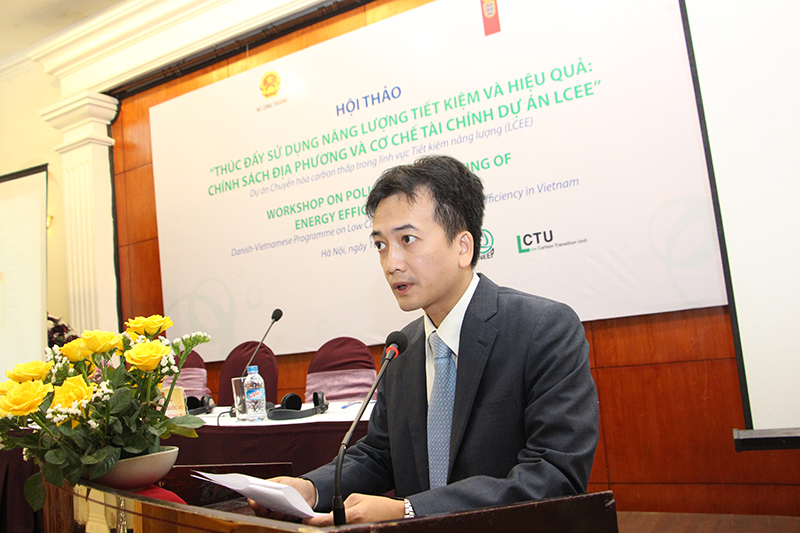Tuesday, 03/03/2026 | 22:23 GMT+7
The legal framework and policy mechanisms play an important role in promoting and implementing the energy-saving and efficiency programs with their most effectiveness.
Important role of the legal framework
Vietnam has great potential for energy savings. The survey results of the Phase 1 DSM project show that energy savings potential of domestic industries such as food processing, textiles, steel and coal is greater than 20%. In particular, the cement industry and agriculture are the largest sectors with energy savings, potentially up to 50%.

Mr. Trinh Quoc Vu – Director of Department of Science, Technology and Energy Efficiency, General Department of Energy
|
Some promulgated legal documents - Circular 02/2014/TT-BCT: Regulation o measures for energy efficiency in industry. - Circular 09/2012/TT-BCT: Planning and reporting on economical and efficient use of energy. - Regulations on energy labeling. Ministry of Construction promulgated Decision 40/2005/QD-BXXD on Vietnam Construction Standards - The works with efficient use of energy. Ministry of Transport promulgated Circular 64/2011/ TT-BGTVT: Regulation of measures for energy savings and efficiency in transportation. |
As stated by Mr. Trinh Quoc Vu – Director of Department of Science, Technology and Energy Efficiency, General Department of Energy, MOIT, the legal framework plays a very important role for successful development and implementation of energy savings.
Overall, the Law on Economical and Efficient Use of Energy is the highest legal framework. Along with this law, many Decrees, Circulars and Decisions are prepared to guide the implementation of the Law and make new provisions relating to specific energy saving and efficiency.
The ministries and sectors should join efforts to enact the laws relating to energy savings and efficiency. These legal documents have been promulgated by many ministries.
Mechanisms to encourage the economical and efficient use of energy
The national target program on energy efficiency (VNEEP) as approved by the Prime Minister includes two phases: Phase I (2006-2010) and Phase II (2012-2015). The program has developed mechanisms to encourage and promote the implementation of operation with economical and efficient use of energy across the country.
Within the framework of the program, many activities are held such as training on capacity building for businesses to use energy with savings and efficiency; support to enterprises to set up energy management system, energy audits, investment into application of solutions that use energy efficiently; developing and implementing the technical assistance projects for manufacturing companies to improve energy efficiency.
|
In Phase 1 of the National Target Program on energy efficiency (VNEEP), from 2006 to 2010, the program aims to save 3-5% of total energy consumption in the country. In Phase 2, from 2011-2015, the program aims to save 5-8% of total energy consumption in the country, equivalent to 11-17 million tons of oil equivalent (toe). Mr. Trinh Quoc Vu, Director of the Department of Science, Technology and Energy Efficiency, Ministry of Industry and Trade, says that the National Target Program of Energy Efficiency shall be reviewed with reports on energy saving from the program by the end of 2015. |
In parallel with the technical support, MOIT also implements various financial mechanisms to support the businesses. The Ministry has deployed the Green Investment Facility (energy efficiency investment funds) of USD6 million of the Low-carbon Transition in Energy Efficiency (LCEE) funded by Denmark. This fund supports the investment of SMEs in three sectors: brick production, ceramics and food processing.
Besides, MOIT and the World Bank (WB) are in preparation of a fund to provide preferential loans worth USD200 million for enterprises to make investment in energy conservation activities. Currently, MOIT is developing a voluntary agreement mechanism to promote economical and efficient energy use in industries. This mechanism will be deployed as a pilot project of voluntary agreements in 2015.
Energy conservation to be promoted
In the future, MOIT will continue with policies to promote energy efficiency in industry. These policies include: energy benchmarking for a number of key industries; setting up and strengthening the database system as a tool for energy efficiency assessment; development of Energy Service Companies market to support the industrial enterprises in their investment into energy efficiency.
In addition, MOIT will continue to strengthen the enforcement of the Law on Economical and Efficient Use of Energy, to improve the capacity of Energy Conservation Center; to provide training to energy auditors; to develop and implement financial mechanisms to support the investment and operations in fields of energy use with savings and efficiency.
Do Trong Tan







